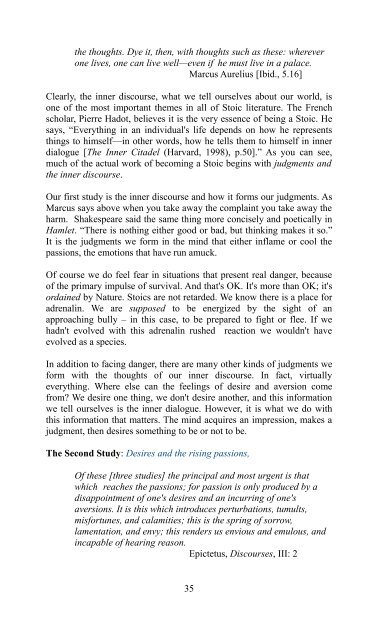The Stoic HANDBOOK - College of Stoic Philosophers
The Stoic HANDBOOK - College of Stoic Philosophers
The Stoic HANDBOOK - College of Stoic Philosophers
Create successful ePaper yourself
Turn your PDF publications into a flip-book with our unique Google optimized e-Paper software.
the thoughts. Dye it, then, with thoughts such as these: wherever<br />
one lives, one can live well—even if he must live in a palace.<br />
Marcus Aurelius [Ibid., 5.16]<br />
Clearly, the inner discourse, what we tell ourselves about our world, is<br />
one <strong>of</strong> the most important themes in all <strong>of</strong> <strong>Stoic</strong> literature. <strong>The</strong> French<br />
scholar, Pierre Hadot, believes it is the very essence <strong>of</strong> being a <strong>Stoic</strong>. He<br />
says, “Everything in an individual's life depends on how he represents<br />
things to himself—in other words, how he tells them to himself in inner<br />
dialogue [<strong>The</strong> Inner Citadel (Harvard, 1998), p.50].” As you can see,<br />
much <strong>of</strong> the actual work <strong>of</strong> becoming a <strong>Stoic</strong> begins with judgments and<br />
the inner discourse.<br />
Our first study is the inner discourse and how it forms our judgments. As<br />
Marcus says above when you take away the complaint you take away the<br />
harm. Shakespeare said the same thing more concisely and poetically in<br />
Hamlet. “<strong>The</strong>re is nothing either good or bad, but thinking makes it so.”<br />
It is the judgments we form in the mind that either inflame or cool the<br />
passions, the emotions that have run amuck.<br />
Of course we do feel fear in situations that present real danger, because<br />
<strong>of</strong> the primary impulse <strong>of</strong> survival. And that's OK. It's more than OK; it's<br />
ordained by Nature. <strong>Stoic</strong>s are not retarded. We know there is a place for<br />
adrenalin. We are supposed to be energized by the sight <strong>of</strong> an<br />
approaching bully – in this case, to be prepared to fight or flee. If we<br />
hadn't evolved with this adrenalin rushed reaction we wouldn't have<br />
evolved as a species.<br />
In addition to facing danger, there are many other kinds <strong>of</strong> judgments we<br />
form with the thoughts <strong>of</strong> our inner discourse. In fact, virtually<br />
everything. Where else can the feelings <strong>of</strong> desire and aversion come<br />
from? We desire one thing, we don't desire another, and this information<br />
we tell ourselves is the inner dialogue. However, it is what we do with<br />
this information that matters. <strong>The</strong> mind acquires an impression, makes a<br />
judgment, then desires something to be or not to be.<br />
<strong>The</strong> Second Study: Desires and the rising passions,<br />
Of these [three studies] the principal and most urgent is that<br />
which reaches the passions; for passion is only produced by a<br />
disappointment <strong>of</strong> one's desires and an incurring <strong>of</strong> one's<br />
aversions. It is this which introduces perturbations, tumults,<br />
misfortunes, and calamities; this is the spring <strong>of</strong> sorrow,<br />
lamentation, and envy; this renders us envious and emulous, and<br />
incapable <strong>of</strong> hearing reason.<br />
Epictetus, Discourses, III: 2<br />
35

















